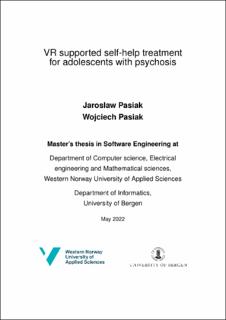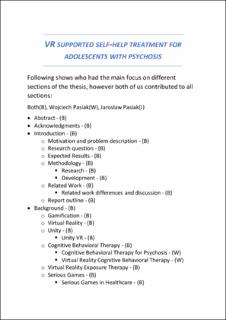| dc.description.abstract | Psychosis is a severe psychological condition that affects some people, including adolescents. Unfortunately, treating psychosis and psychotic disorders takes a long time. Cognitive Behavioral Therapy (CBT) and CBT for treating psychosis (CBTp) promise the most effective treatment; however, it is too long, considerably affects patients’ individual lives, and involves high individual costs. Using Virtual Reality (VR) technology, behavioral experiments in CBTp can be carried out during therapy sessions by exposing the patient to simulated social scenarios that they find challenging. This CBT-supported process promises improvements in increased patients’ experiences and allows patient gains in their regular lives. This report illustrates the development based on a VR-assisted treatment protocol currently being developed and clinically tested at the Department of Child and Adolescent Psychiatry at Haukeland University Hospital, Bergen, Norway, and the possibilities of a VR self-help application as a supplement to clinical sessions. Furthermore, patients will be able to perform different social-training exercises in familiar home conditions using the therapists’ defined guidelines prepared beforehand. This project application uses VR technology and speech recognition to reach this goal of self-help treatment. With the help of speech recognition, the VR application can understand what the patient is saying, provide appropriate feedback, and assure a flow in the conversation through the different scenarios. An iterative mixed method, including system usability tests and follow-up interviews with clinical domain experts, was conducted to test this application’s usability and feasibility. First testing iterations’ System Usability Scale (SUS) results were positive and indicated concrete issues for improvement. Moreover, the final testing iteration delivered excellent results, showing the possibility of using a VR-supported self-help treatment for psychosis. Psychosis is a severe psychological condition that affects some people, including adolescents. Unfortunately, treating psychosis and psychotic disorders takes a long time. Cognitive Behavioral Therapy (CBT) and CBT for treating psychosis (CBTp) promise the most effective treatment; however, it is too long, considerably affects patients’ individual lives, and involves high individual costs. Using Virtual Reality (VR) technology, behavioral experiments in CBTp can be carried out during therapy sessions by exposing the patient to simulated social scenarios that they find challenging. This CBT-supported process promises improvements in increased patients’ experiences and allows patient gains in their regular lives. This report illustrates the development based on a VR-assisted treatment protocol currently being developed and clinically tested at the Department of Child and Adolescent Psychiatry at Haukeland University Hospital, Bergen, Norway, and the possibilities of a VR self-help application as a supplement to clinical sessions. Furthermore, patients will be able to perform different social-training exercises in familiar home conditions using the therapists’ defined guidelines prepared beforehand. This research application uses VR technology and speech recognition to reach this goal of self-help treatment. With the help of speech recognition, the VR application can understand what the patient is saying, provide appropriate feedback, and assure a flow in the conversation through the different scenarios. An iterative mixed method, including system usability tests and follow-up interviews with clinical domain experts, was conducted to test this application’s usability and feasibility. First testing iterations’ System Usability Scale (SUS) results were positive and indicated concrete issues for improvement. Moreover, the final testing iteration delivered excellent results, showing the possibility of using a VR-supported self-help treatment for psychosis. | |


